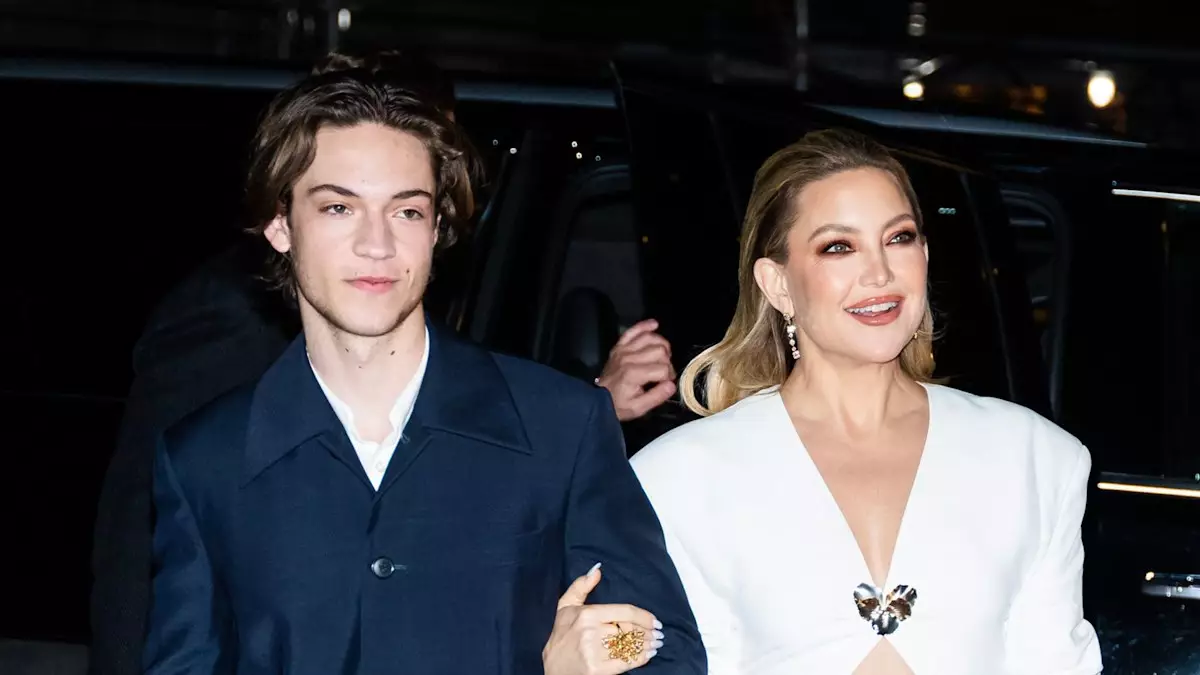Kate Hudson’s evolution as a mother over the past 21 years has not only shaped her identity but also painted a rich landscape of insights into the art of parenting. From her first child, Ryder, to her youngest, Rani, Hudson has uniquely navigated the challenges and joys that come with motherhood. In a candid discussion with Kylie Kelce on the “Not Gonna Lie” podcast, Hudson shared her perspective as an increasingly seasoned mother, particularly in the wake of Kelce welcoming her fourth child. Their conversation highlighted Hudson’s belief that to truly thrive as a parent, one must embrace the delicate balance between freedom and connection.
The Philosophy of Letting Go
One of the central tenets of Hudson’s parenting approach is the philosophy of liberation—particularly letting her children experience life independently. “Let your kids go,” she emphasized, nearly advocating for parents to relinquish control. This rebellious call to action dismantles traditional notions of parenthood, breaking free from the suffocating confines of expectations. Hudson’s method is rooted in an empowering belief: by allowing children to explore the world on their own terms, they will inevitably return to the nurturing embrace of their parent. This perspective challenges the pervasive belief that parental connection can only thrive through constant proximity and oversight.
Hudson articulates a poignant reality: the tighter parents hold on, the more smothered their children feel. This insight is reflective of an emerging trend in parenting psychology that prioritizes emotional intelligence over authoritarian control. She champions the notion that letting go does not signify a lack of love; rather, it is a profound expression of trust and respect for her children’s autonomy.
The Complicated Role of Expectations
Hudson confronts the burden of expectation head-on. She cautions against the tendency for parents to impose their desires onto their children, declaring, “You need to let them be for a bit.” This revelation resonates deeply in today’s world, where societal pressures often dictate parenting styles. By advocating for a less encumbered relationship, Hudson does more than just suggest a parenting fad; she redefines the parent-child dynamic in a way that nurtures both personal growth and relational depth.
As the conversation with Kelce unfolded, Hudson acknowledged her own experiences of growth alongside her children. This concept of mutual evolution—growing together—demonstrates a refreshing shift from the traditional parent-child dichotomy, evolving into a partnership built on shared experiences and reciprocal learning.
Reflections on Change
The emotional weight of change looms large in Hudson’s life, particularly as Ryder transitioned to university life in New York. Her openness about the bittersweet feelings surrounding his move captures a universal parental struggle: balancing one’s own yearning for closeness with the realization that independence is part of a child’s healthy development. Hudson refreshingly admitted, “It’s so hard,” underscoring the complex reality of parenting adult children. In revealing her vulnerability, she creates a relatable narrative that encourages other parents to embrace their feelings of loss when faced with such transitions.
Moreover, her candid commentary on maintaining connection amidst physical distances invites a broader conversation about the increasing mobility of today’s youth. As millions of parents face similar scenarios, Hudson’s experience emphasizes the importance of creating a support network, nurturing friendships with those who share similar life stages. Her camaraderie with fellow mothers like Gwyneth Paltrow and Reese Witherspoon highlights the power of community in navigating the trials of motherhood, reinforcing the idea that no one has to tread this journey alone.
The Beautiful Reciprocity of Parenting
Throughout her discussion, Hudson illuminated the concept of reciprocity between parent and child. In a touching moment, she shared how Ryder, once a dependent child, had evolved into a confidant, offering her reflections on her busy life. This role reversal illustrates the fruits of her parenting philosophy: by investing love and freedom into her son’s life, Hudson reaps the rewards of insight and connection. It is a powerful reminder that relationships between parents and their children are not static; they are fluid and ever-changing, mirroring the growth and development of both parties.
Ultimately, Kate Hudson’s insights reflect a modern, empathetic approach to parenting that challenges the conventional norms, making a strong case for trust, freedom, and emotional reciprocity. As parents like Hudson continue to share their journeys, they encourage others to rethink traditional values and embrace a more collaborative, liberated approach to raising the next generation.

